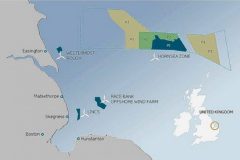The Marine Management Organisation (MMO) held the UK launch event for the €243m European Maritime and Fisheries Fund (EMFF) scheme at Poole on Monday 8 February.
Above: Fisheries Minister George Eustice, with MMO Chief Executive John Tuckett (left) and Chairman Sir Bill Callaghan (right), at the UK launch event for the €243m European Maritime and Fisheries Fund scheme at Poole last week.
The event was attended by UK Fisheries Minister George Eustice MP, DEFRA, representatives of the UK devolved administrations, representatives of the European Commission and key representatives of the fisheries and wider marine sector.
MMO Chairman Sir Bill Callaghan and Chief Executive John Tuckett told the delegates how the EMFF scheme had been developed based on feedback from industry, experience of operating the European Fisheries Fund (EFF), and in partnership with delivery partners including DEFRA and the devolved administrations.
The Commission informed delegates that it was pleased with the development of the EMFF scheme in the UK, and was confident of both the MMO and the devolved administrations’ ability to deliver the EMFF programme. This was supported by the MMO’s experience in managing European funding schemes for the UK.
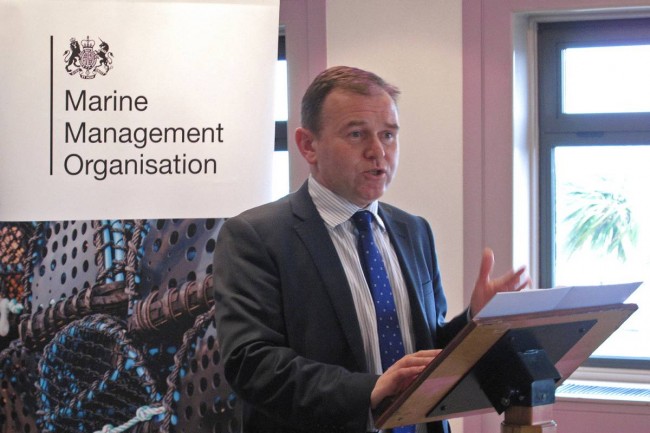
UK Fisheries Minister George Eustice addresses delegates during the EMFF launch event held by the MMO in Poole.
The minister spoke about the importance of EMFF to the fisheries sector, and the much-needed help it would bring to support fishermen with legislative changes such as CFP reform.
An open discussion was then held between all attendees as to how industry, the MMO and the devolved administrations could continue to work together on the new scheme. Further enhancements to the EMFF, and the funding opportunities it presents to the UK were also discussed.
Marine and Fisheries Minister, George Eustice said: “Today’s EMFF launch event has given me the chance to speak firsthand with representatives of the fisheries, aquaculture, and processing sectors. I have heard just how important the €243m fund will be, to help them to adapt to the discard ban and create growth across the entire seafood sector.
“The fund can support fishermen and the wider seafood industry in every part of the UK, and I would urge people to visit the MMO website to learn more about the scheme and the support available.”
The minister explained that the EMFF is part of the European Structural Investment Funds, which focus on key areas such as employment and innovation across the EU. He stressed the need for the funds to be used efficiently, and for the industry to be closely involved in allocation decisions.
The UK’s share of the EMFF is approximately £200m (€243m), which will be allocated over the next five years. Over half of that (£110m) will be available as direct industry support for the seafood sector, with businesses and individuals being able to submit applications for funding across a wide range of support measures.
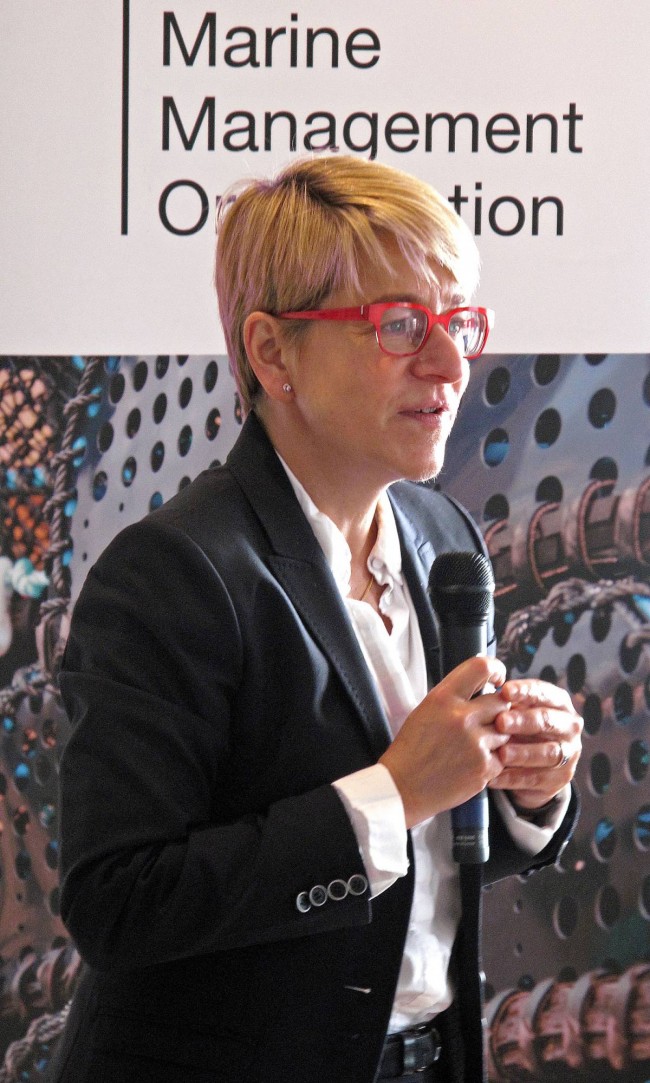
Isabelle Garzon of DG Mare gives the EU Commission’s position.
“This programme has the potential to improve livelihoods, increase resilience and transform those communities who are reliant on the fisheries, processing and aquaculture sectors,” said the minister. “Opportunities will be provided right across the production chain, from the catching and aquaculture sectors, through to influencing consumers and what ends up on our plates.
“A number of changes have been made to the way the new fund will be administered compared to previous schemes, to ensure it is focused on increased competitiveness, encourages economic growth, and promotes innovation throughout the production chain. In order to successfully deliver these priorities and make sure the funding is spent where it will have the greatest impact, we must be strategic in our approach for delivery.
“To achieve the most from the fund, we need to work closely with industry representatives throughout the programme. We want to make sure the EMFF is driven and steered with industry input, to encourage long-term growth for a sustainable industry. At the UK level, we work closely with our Programme Monitoring Committee (PMC), which provides a range of industry, academic, and environmental expertise.
“In England, Seafish will bring together a group of experts representing the seafood supply chain. The group, and how it can support the delivery of the EMFF, is currently being finalised.
“In the meantime, some key measures have already been opened for applications. These are focused on areas where we know the industry will benefit from support right away, and across the whole of the UK,” said the minister.
These measures include:
● Those that will support UK fisheries businesses adapt to the reformed CFP, and, more specifically, meet the challenges presented by the recent introduction of the demersal landing obligation. This includes funding to help fishermen buy more selective gear, and for investments in landing sites, ports, and harbours to assist in implementing the landing obligation.
● Support for technical innovation projects, where funding will be available to support innovative approaches and technologies that improve catching, farming and marketing, for economic gain and environmental benefits.
● Measures that improve scientific knowledge, training, and safety will be accessible for the lifetime of the programme. There is a commitment to improving health and safety – particularly on board vessels – encouraging knowledge-sharing, and developing and improving partnerships between the scientific and fishing communities.
● Measures to support sustainable aquaculture have also been opened from the start of the programme.
The minister said measures would be targeted throughout the UK by the Intermediate Bodies in England, Northern Ireland, Scotland and Wales. Funding will be focused on supporting local requirements, rather than assuming that ‘one size fits all’.
“We look forward to working alongside industry to ensure the EMFF is there to help individuals and businesses to grow and adapt,” said the minister.
Further details of the EMFF scheme are available at gov.uk, by entering ‘EMFF’ in the Search box.
EMFF UK Budgets
Union Priority 1: Supporting Sustainable Fisheries = €67.4m (28%)
Union Priority 2: Sustainable Aquaculture = €19.3m (8%)
Union Priority 3: CFP Enforcement = €44.2m (18%)
Union Priority 4: Data Collection = €52.4m (22%)
Union Priority 4: FLAGS = €13.6m (6%)
Union Priority 5: Processing and Marketing = €27.3m (11%)
Union Priority 6: Integrated Maritime Policy = €5.4m (2%)
Scheme Running Costs until 2020 = €12.5m (5%)
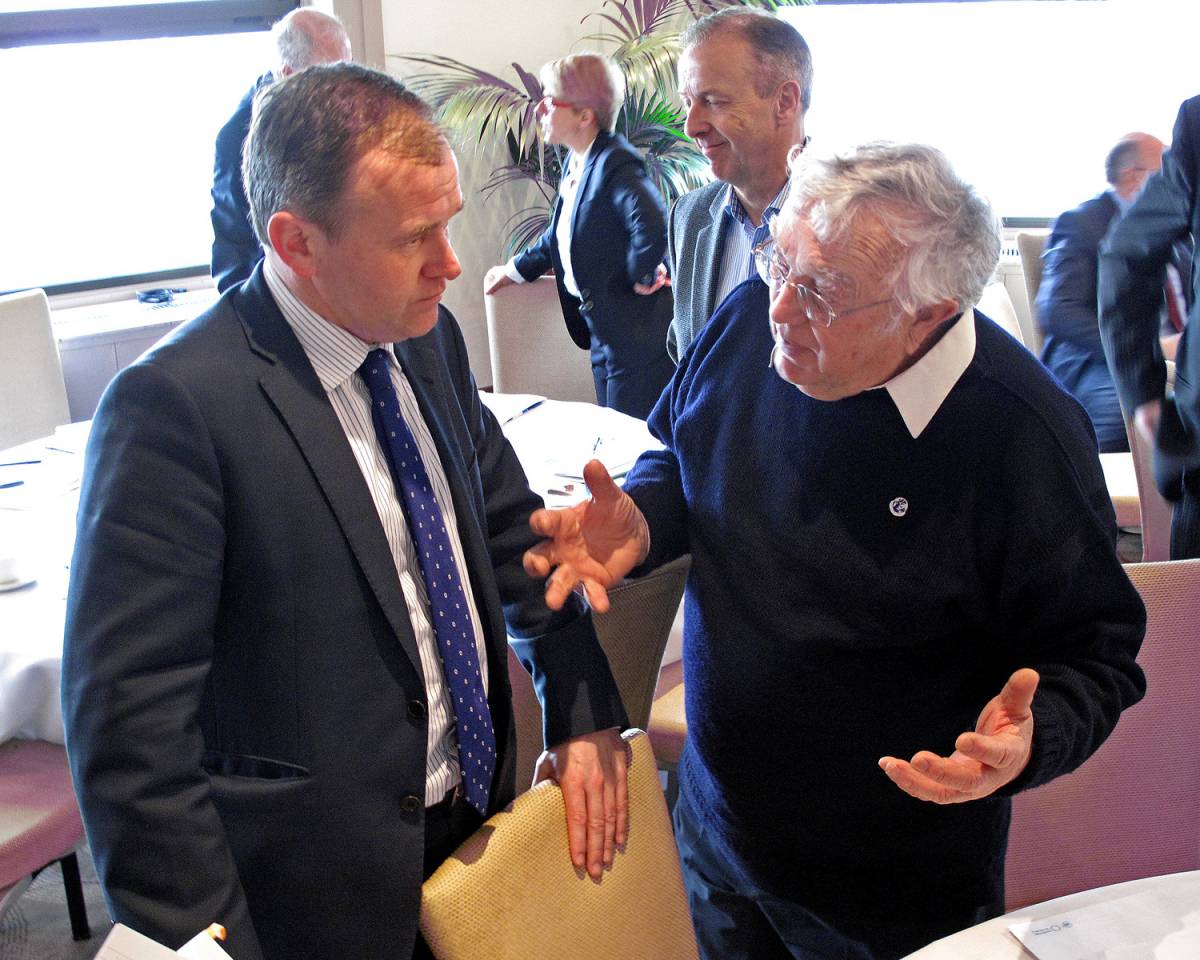
David Sales of the South Coast Fishermen’s Association in discussion with UK Fisheries Minister George Eustice.
‘Coastal communities at the heart of our work’
MMO chairman Sir Bill Callaghan said the MMO recognised the importance of coastal communities and that they were ‘at the very heart’ of its work. “We recognise that the fishing industry and wider sector are critical to the UK, putting food on our tables and contributing to our national economy.”
He said the MMO makes great efforts to engage and understand fisheries and holds ‘quota surgeries’ around the coast so that fishermen can discuss quota matters directly with quota managers. Key industry figures also sit on a fisheries panel and there is a vital network of coastal offices.
Industry experts inform the work of the MMO and sit on the Programme Monitoring Committee (PMC), to help administer the EMFF.
“Quota surgeries, the fisheries panel and the PMC are examples of the MMO responding to the needs of industry and adapting its operations in line with those needs,” said Mr Callaghan.
He said the MMO has worked with colleagues in Scotland, Wales and Northern Ireland to combine expertise and develop the new EMFF scheme so it is more accessible to more people. Enhancements put in place for the EMFF scheme over the previous schemes include:
● A smart e-application system that tailors itself to the application being completed (there was a short demonstration during the launch of how to apply for funding online). Instead of having to go through a great number of sections and guidance not necessarily relevant to everyone – now, as an applicant provides more information, the application form cuts itself down and presents the relevant options. As an EMFF application is completed online, EMFF colleagues can see the application in real time and provide assistance as needed over the telephone.
● The website has been reshaped to make information about the EMFF more accessible, and to give clear guidance to help people understand what can be funded. The approach is to ensure that, whether an applicant has a query by telephone, email, letter or in person, they will have access to the same expert advice.
● An EMFF helpline has been created, along with a dedicated mailbox to ensure customers get the support they need.
‘Heartfelt thanks’ to industry organisations
MMO Chief Executive John Tuckett said that while the MMO is the Managing Authority for the EMFF scheme in the UK, and delivers the scheme in England, it had worked, and will work, closely with the devolved administrations to deliver the scheme in Scotland, Northern Ireland and Wales.
He said DEFRA had led the design of the Operational Programme using input from the MMO and the devolved administrations. This work was approved by the European Commission just before Christmas last year, and he welcomed the attendance of Commission officials at the launch.
The chief executive also gave his ‘heartfelt thanks’ to the many organisations that had worked with the MMO on the EMFF, including the NFFO, CEFAS, Seafish, RNLI, the IFCAs, British Ports Association, various fishing associations, POs and the aquaculture sector. They had given their time and expertise in numerous meetings, workshops and training sessions to help ensure the EMMF meets the priorities of the people who use it.
Mr Tuckett said Scotland had opened its scheme, Wales and Northern Ireland would be launching their schemes soon, and he gave some information on the scheme in England. Over €33m is already available for a wide range of initiatives, including assistance for the fisheries sector to adapt to CFP reform and the landing obligation, and opening up funding for Fisheries Local Action Groups (FLAGs).
“I am delighted to tell you that we are in the final stages of approving our first application under the scheme,” Mr Tuckett told the conference. The remaining parts of the fund will be opened later this year.
“We will use what we learn from the initial opening of the scheme to build the skills and knowledge further. I give you my assurance that the MMO will listen to scheme users, and we will continue to adapt EMFF wherever we can in line with that feedback.”
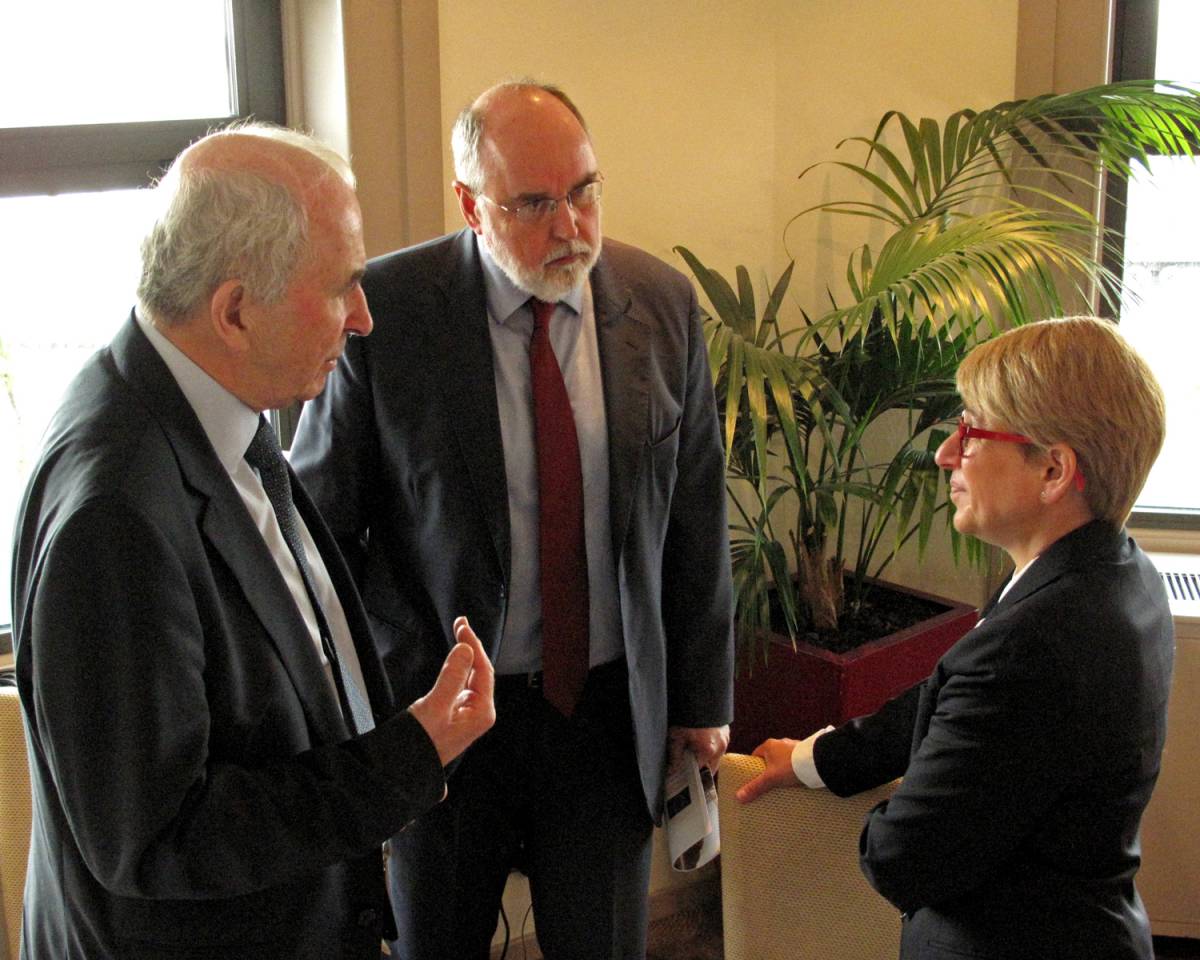
MMO Chief Executive John Tuckett, Professor John Humphrys of the Southern IFCA and DG Mare’s Isabelle Garzon, discussing funding for Fisheries Local Action Groups (FLAGs).
Scottish FLAGs win £6.5M
Groups representing fishing and aquaculture industries are being encouraged to apply for a share of money from the European and Maritime Fisheries Fund.
Scottish Fisheries Secretary Richard Lochhead has announced that, in a UK first, eight Scottish FLAGs have won a share of the EMFF, worth £6.5m, to support and develop the fishing industry in key areas.
Encouraging more applications, Mr Lochhead said: “The fishing and aquaculture industries make a vital contribution, providing jobs and sustaining services, in many coastal communities around Scotland. The EMFF provides funding to support fishermen, sustainable aquaculture, the processing sector and the communities that depend on them.
“We have already seen applications being made and I’d encourage other eligible groups to think about whether they could benefit from this funding.
“For the first time in the UK, I have approved an allocation for six Fisheries Local Action Groups, which will benefit communities through funding job creation, diversification opportunities, opportunities for training, and promotion of environmental measures.
“I am confident the local groups will make a real difference in the coastal communities they serve – from Shetland to Dumfries and Galloway.”
Poole bids for FLAG
Professor John Humphrys, retired marine biologist and a member of the Southern IFCA, said that a FLAG with its focus on Poole Harbour is a real possibility.
“We’re going to go for a FLAG, and we have quite a powerful case for this, with the backing of a consortium behind us, comprising the Borough of Poole, Purbeck Council, Poole Harbour Commissioners, Dorset Wildlife Trusts, the Poole and District Fishermen’s Association, and others,” he said.
“This is about inshore fisheries, which are arguably the most sustainable fisheries, and it has to be recognised that inshore fishing fleets are closely linked to communities. The economic benefits of a successful fishing fleet are felt by the wider community.”
He commented that Poole Harbour is a complex area, with two proposed SPAs under the birds directive, MPAs, a working commercial port with ferry traffic and shipping, plus England’s largest oyster-farming beds, as well as a fleet of around 90 fishing vessels, all of them under 10 metres.
“In this kind of situation, small-scale fisheries don’t always have a voice,” he said.
“Poole Harbour is intensely exploited, as is the coast offshore. It’s an extremely busy place, but we hope we can all work together. We hope the SPAs will be sympathetic to the long-established fisheries here.”
The option of establishing a FLAG for Poole Harbour is something he sees as a route to draw-in funding to support the local fishing fleet.
“It would help investment in the fleet, providing them with ways to operate more efficiently, as well as helping deal with the regulatory regime and to operate effectively with the MPAs.”
Further information on how to become an EMFF FLAG is available at gov.uk, by entering ‘EMFF FLAGs’ in the Search box.
The MMO will also be holding an event for potential FLAGs in London on February 24. Details and registration for the event can be obtained by emailing: EMFF.Queries@ marinemanagement.org.uk
Read more from Fishing News here…


The Marine Management Organisation (MMO) held the UK launch event for the €243m European Maritime and Fisheries Fund (EMFF) scheme at Poole on Monday 8 February.
Above: Fisheries Minister George Eustice, with MMO Chief Executive John Tuckett (left) and Chairman Sir Bill Callaghan (right), at the UK launch event for the €243m European Maritime and Fisheries Fund scheme at Poole last week.
The event was attended by UK Fisheries Minister George Eustice MP, DEFRA, representatives of the UK devolved administrations, representatives of the European Commission and key representatives of the fisheries and wider marine sector.
MMO Chairman Sir Bill Callaghan and Chief Executive John Tuckett told the delegates how the EMFF scheme had been developed based on feedback from industry, experience of operating the European Fisheries Fund (EFF), and in partnership with delivery partners including DEFRA and the devolved administrations.
The Commission informed delegates that it was pleased with the development of the EMFF scheme in the UK, and was confident of both the MMO and the devolved administrations’ ability to deliver the EMFF programme. This was supported by the MMO’s experience in managing European funding schemes for the UK.

UK Fisheries Minister George Eustice addresses delegates during the EMFF launch event held by the MMO in Poole.
The minister spoke about the importance of EMFF to the fisheries sector, and the much-needed help it would bring to support fishermen with legislative changes such as CFP reform.
An open discussion was then held between all attendees as to how industry, the MMO and the devolved administrations could continue to work together on the new scheme. Further enhancements to the EMFF, and the funding opportunities it presents to the UK were also discussed.
Marine and Fisheries Minister, George Eustice said: “Today’s EMFF launch event has given me the chance to speak firsthand with representatives of the fisheries, aquaculture, and processing sectors. I have heard just how important the €243m fund will be, to help them to adapt to the discard ban and create growth across the entire seafood sector.
“The fund can support fishermen and the wider seafood industry in every part of the UK, and I would urge people to visit the MMO website to learn more about the scheme and the support available.”
The minister explained that the EMFF is part of the European Structural Investment Funds, which focus on key areas such as employment and innovation across the EU. He stressed the need for the funds to be used efficiently, and for the industry to be closely involved in allocation decisions.
The UK’s share of the EMFF is approximately £200m (€243m), which will be allocated over the next five years. Over half of that (£110m) will be available as direct industry support for the seafood sector, with businesses and individuals being able to submit applications for funding across a wide range of support measures.

Isabelle Garzon of DG Mare gives the EU Commission’s position.
“This programme has the potential to improve livelihoods, increase resilience and transform those communities who are reliant on the fisheries, processing and aquaculture sectors,” said the minister. “Opportunities will be provided right across the production chain, from the catching and aquaculture sectors, through to influencing consumers and what ends up on our plates.
“A number of changes have been made to the way the new fund will be administered compared to previous schemes, to ensure it is focused on increased competitiveness, encourages economic growth, and promotes innovation throughout the production chain. In order to successfully deliver these priorities and make sure the funding is spent where it will have the greatest impact, we must be strategic in our approach for delivery.
“To achieve the most from the fund, we need to work closely with industry representatives throughout the programme. We want to make sure the EMFF is driven and steered with industry input, to encourage long-term growth for a sustainable industry. At the UK level, we work closely with our Programme Monitoring Committee (PMC), which provides a range of industry, academic, and environmental expertise.
“In England, Seafish will bring together a group of experts representing the seafood supply chain. The group, and how it can support the delivery of the EMFF, is currently being finalised.
“In the meantime, some key measures have already been opened for applications. These are focused on areas where we know the industry will benefit from support right away, and across the whole of the UK,” said the minister.
These measures include:
● Those that will support UK fisheries businesses adapt to the reformed CFP, and, more specifically, meet the challenges presented by the recent introduction of the demersal landing obligation. This includes funding to help fishermen buy more selective gear, and for investments in landing sites, ports, and harbours to assist in implementing the landing obligation.
● Support for technical innovation projects, where funding will be available to support innovative approaches and technologies that improve catching, farming and marketing, for economic gain and environmental benefits.
● Measures that improve scientific knowledge, training, and safety will be accessible for the lifetime of the programme. There is a commitment to improving health and safety – particularly on board vessels – encouraging knowledge-sharing, and developing and improving partnerships between the scientific and fishing communities.
● Measures to support sustainable aquaculture have also been opened from the start of the programme.
The minister said measures would be targeted throughout the UK by the Intermediate Bodies in England, Northern Ireland, Scotland and Wales. Funding will be focused on supporting local requirements, rather than assuming that ‘one size fits all’.
“We look forward to working alongside industry to ensure the EMFF is there to help individuals and businesses to grow and adapt,” said the minister.
Further details of the EMFF scheme are available at gov.uk, by entering ‘EMFF’ in the Search box.
EMFF UK Budgets
Union Priority 1: Supporting Sustainable Fisheries = €67.4m (28%)
Union Priority 2: Sustainable Aquaculture = €19.3m (8%)
Union Priority 3: CFP Enforcement = €44.2m (18%)
Union Priority 4: Data Collection = €52.4m (22%)
Union Priority 4: FLAGS = €13.6m (6%)
Union Priority 5: Processing and Marketing = €27.3m (11%)
Union Priority 6: Integrated Maritime Policy = €5.4m (2%)
Scheme Running Costs until 2020 = €12.5m (5%)

David Sales of the South Coast Fishermen’s Association in discussion with UK Fisheries Minister George Eustice.
‘Coastal communities at the heart of our work’
MMO chairman Sir Bill Callaghan said the MMO recognised the importance of coastal communities and that they were ‘at the very heart’ of its work. “We recognise that the fishing industry and wider sector are critical to the UK, putting food on our tables and contributing to our national economy.”
He said the MMO makes great efforts to engage and understand fisheries and holds ‘quota surgeries’ around the coast so that fishermen can discuss quota matters directly with quota managers. Key industry figures also sit on a fisheries panel and there is a vital network of coastal offices.
Industry experts inform the work of the MMO and sit on the Programme Monitoring Committee (PMC), to help administer the EMFF.
“Quota surgeries, the fisheries panel and the PMC are examples of the MMO responding to the needs of industry and adapting its operations in line with those needs,” said Mr Callaghan.
He said the MMO has worked with colleagues in Scotland, Wales and Northern Ireland to combine expertise and develop the new EMFF scheme so it is more accessible to more people. Enhancements put in place for the EMFF scheme over the previous schemes include:
● A smart e-application system that tailors itself to the application being completed (there was a short demonstration during the launch of how to apply for funding online). Instead of having to go through a great number of sections and guidance not necessarily relevant to everyone – now, as an applicant provides more information, the application form cuts itself down and presents the relevant options. As an EMFF application is completed online, EMFF colleagues can see the application in real time and provide assistance as needed over the telephone.
● The website has been reshaped to make information about the EMFF more accessible, and to give clear guidance to help people understand what can be funded. The approach is to ensure that, whether an applicant has a query by telephone, email, letter or in person, they will have access to the same expert advice.
● An EMFF helpline has been created, along with a dedicated mailbox to ensure customers get the support they need.
‘Heartfelt thanks’ to industry organisations
MMO Chief Executive John Tuckett said that while the MMO is the Managing Authority for the EMFF scheme in the UK, and delivers the scheme in England, it had worked, and will work, closely with the devolved administrations to deliver the scheme in Scotland, Northern Ireland and Wales.
He said DEFRA had led the design of the Operational Programme using input from the MMO and the devolved administrations. This work was approved by the European Commission just before Christmas last year, and he welcomed the attendance of Commission officials at the launch.
The chief executive also gave his ‘heartfelt thanks’ to the many organisations that had worked with the MMO on the EMFF, including the NFFO, CEFAS, Seafish, RNLI, the IFCAs, British Ports Association, various fishing associations, POs and the aquaculture sector. They had given their time and expertise in numerous meetings, workshops and training sessions to help ensure the EMMF meets the priorities of the people who use it.
Mr Tuckett said Scotland had opened its scheme, Wales and Northern Ireland would be launching their schemes soon, and he gave some information on the scheme in England. Over €33m is already available for a wide range of initiatives, including assistance for the fisheries sector to adapt to CFP reform and the landing obligation, and opening up funding for Fisheries Local Action Groups (FLAGs).
“I am delighted to tell you that we are in the final stages of approving our first application under the scheme,” Mr Tuckett told the conference. The remaining parts of the fund will be opened later this year.
“We will use what we learn from the initial opening of the scheme to build the skills and knowledge further. I give you my assurance that the MMO will listen to scheme users, and we will continue to adapt EMFF wherever we can in line with that feedback.”

MMO Chief Executive John Tuckett, Professor John Humphrys of the Southern IFCA and DG Mare’s Isabelle Garzon, discussing funding for Fisheries Local Action Groups (FLAGs).
Scottish FLAGs win £6.5M
Groups representing fishing and aquaculture industries are being encouraged to apply for a share of money from the European and Maritime Fisheries Fund.
Scottish Fisheries Secretary Richard Lochhead has announced that, in a UK first, eight Scottish FLAGs have won a share of the EMFF, worth £6.5m, to support and develop the fishing industry in key areas.
Encouraging more applications, Mr Lochhead said: “The fishing and aquaculture industries make a vital contribution, providing jobs and sustaining services, in many coastal communities around Scotland. The EMFF provides funding to support fishermen, sustainable aquaculture, the processing sector and the communities that depend on them.
“We have already seen applications being made and I’d encourage other eligible groups to think about whether they could benefit from this funding.
“For the first time in the UK, I have approved an allocation for six Fisheries Local Action Groups, which will benefit communities through funding job creation, diversification opportunities, opportunities for training, and promotion of environmental measures.
“I am confident the local groups will make a real difference in the coastal communities they serve – from Shetland to Dumfries and Galloway.”
Poole bids for FLAG
Professor John Humphrys, retired marine biologist and a member of the Southern IFCA, said that a FLAG with its focus on Poole Harbour is a real possibility.
“We’re going to go for a FLAG, and we have quite a powerful case for this, with the backing of a consortium behind us, comprising the Borough of Poole, Purbeck Council, Poole Harbour Commissioners, Dorset Wildlife Trusts, the Poole and District Fishermen’s Association, and others,” he said.
“This is about inshore fisheries, which are arguably the most sustainable fisheries, and it has to be recognised that inshore fishing fleets are closely linked to communities. The economic benefits of a successful fishing fleet are felt by the wider community.”
He commented that Poole Harbour is a complex area, with two proposed SPAs under the birds directive, MPAs, a working commercial port with ferry traffic and shipping, plus England’s largest oyster-farming beds, as well as a fleet of around 90 fishing vessels, all of them under 10 metres.
“In this kind of situation, small-scale fisheries don’t always have a voice,” he said.
“Poole Harbour is intensely exploited, as is the coast offshore. It’s an extremely busy place, but we hope we can all work together. We hope the SPAs will be sympathetic to the long-established fisheries here.”
The option of establishing a FLAG for Poole Harbour is something he sees as a route to draw-in funding to support the local fishing fleet.
“It would help investment in the fleet, providing them with ways to operate more efficiently, as well as helping deal with the regulatory regime and to operate effectively with the MPAs.”
Further information on how to become an EMFF FLAG is available at gov.uk, by entering ‘EMFF FLAGs’ in the Search box.
The MMO will also be holding an event for potential FLAGs in London on February 24. Details and registration for the event can be obtained by emailing: EMFF.Queries@ marinemanagement.org.uk
Read more from Fishing News here…

